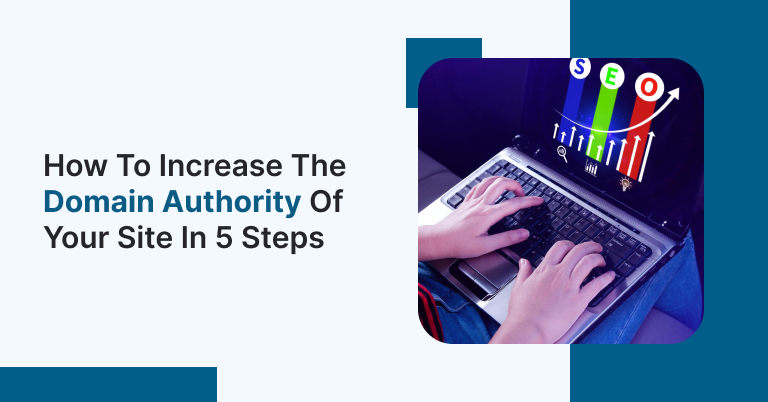
How to increase the Domain Authority of your site in 5 steps
Are you having trouble raising your domain authority and ranking well on Google’s search engine results page (SERP)?
It is noted that over 25% of users click on the first result they see while searching on Google. It is also said that only 2% of people click on the ads on the first page. Naturally, you want to constantly appear at the top of the organic search results.
Your Domain Authority is a major factor in that.
By the time you finish reading this article, you’ll understand how domain authority scores are calculated, what factors affect page authority, how to increase your domain authority, and much more.
What is Domain Authority?
It speaks to a website’s authority or credibility in a sector or field. Domain Authority, or simply DA, is a rating score system that was created by the Moz team in the beginning.
A website’s domain authority (DA), which ranges from 0 to 100, is a statistic that attempts to forecast a website’s position in search engines.
Your chances of receiving more organic traffic and ranking higher in search engine result pages (SERPS) increase with your domain authority.
Why Domain Authority is important?
One of the top-ranking variables in SERPs is domain authority. In summary, when it comes to ranking and boosting organic traffic, your website’s domain authority score will assist you in assessing how competitive you are in your field.
The Domain Authority score functions best when used as a benchmark.
It’s a good idea to monitor your DA score and make gradual improvements. Your score will be 1 if it’s your first website.
For Example: Consider the following situation:
You’re an experienced skin care specialist, so you decide to launch a blog devoted to natural skincare remedies and routines. You publish blog entries at a rapid rate, hoping to take the top place in search engine results pages (SERPs). But, You can’t even find your blog on the last 10 pages.
If you followed the go-by-the-book rule strictly, then what is the problem?
Here is the answer to your answer, It turns out that large websites with a big domain authority of 70–90+ have dominated skincare content for more than decades.
Your brand-new site barely receives any attention due to its low DA of 1, whereas anything they post instantly rises to the top of the list.
Domain Authority Vs Page Authority
The strength and performance of your website as a whole are measured by domain authority (DA), whereas the ranking power and strength of individual pages are measured by page authority (PA).
Page authority can assist you in creating a successful digital strategy by pointing out pages that have the most room for development.
To raise your total domain authority, you can use the page authority rankings to process individual pages on your website and enhance the content on them.
How to Calculate Domain Authority?
Although each SEO tool, such as Moz, Semrush, or Ahrefs uses various approaches to determine domain authority, they all ultimately use two factors: high-quality backlinks and relevant content.
Both the quantity and quality of the links pointing to your website are taken into account when calculating your Domain Authority score.
There is a 100-point rating system for domain authority. It is therefore simpler to raise your site’s score from 20 to 30 than from 70 to 80.
A 100 DA number is extremely hard to get. Don’t worry if you never reach 100; it’s available on sites like Facebook and Google. It is challenging to directly influence DA. Unlike meta tags, which can be changed, your DA score cannot be changed.
How to increase Domain Authority?
It’s time to find out how to raise the domain authority score of your website now that you understand what it is and why it matters. By following the five steps listed below, you can boost your domain authority quickly.
Create Quality Content
The first thing you should concentrate on if you want to increase domain authority is producing quality content. Along with writing, try making films, designing infographics, adding statistics, conducting data research, and other things.
Google gives priority to unique, valuable material that answers the reader’s search query. Because of this, producing excellent content is essential from an SEO standpoint.
You must carry out appropriate keyword research to determine what content your users are searching for. This will assist you in choosing topics for your writing and vocabulary for those who read it.
Content that fulfills search intent is reliable. When you optimize your content for search engines, you can boost its ranking on search engine results pages (SERPs) by utilizing keywords and on-page SEO best practices.
Develop Strong Internal Linking
A link pointing to another page within the same website is called an internal link. They make it simple for users to navigate your website and support the establishment of your website’s information structure.
Internal links also aid in the website’s hyperlink distribution. Having greater content means you’ll have more links to share, which is awesome.
Additionally, you can create a solid site network more easily with the more internal links you make.
A website without an internal connection is fragmented and unfinished, much like a jigsaw puzzle with missing pieces. On the other hand, a website with strong internal connectivity is unified and finished, much like a masterpiece painting.
Build Quality Backlinks
Obtaining backlinks from websites with a higher domain authority score is the most efficient strategy to raise your domain authority. High-quality backlinks are crucial in terms of domain authority. Your score will increase with the amount you possess.
Despite its decline in popularity, guest posting remains a viable strategy for increasing the number of links pointing to your website.
Links from guest blogging websites should have a high domain authority and a strong content foundation to be considered valuable.
Removing bad links is also necessary to keep your link profile strong, which might raise your domain authority score. Then, to make the link less valuable, you can request that the website owners delete it or add a “nofollow tag.”
Improve your Technical SEO
You have to improve your website’s overall SEO if you want to see a gain in domain authority. Enhancing your site’s domain authority starts with making sure that its technical SEO is in order.
Technical SEO is, after all, the foundation of any domain authority improvement initiative.
Technical SEO includes elements like mobile friendliness, HTML code length, metadata, schema markup, and site performance.
Content marketing and SEO are mutually dependent. In reality, they complement each other. This implies that before aiming for a higher DA, you must ensure that your SEO is at a high level.
Get Listed in the Online Directories
Getting your domain included in web directories is an easy and highly impactful method of raising your DA for small and local enterprises.
Key information about local companies can be better understood by search engines with the use of information found in internet directories such as the actual location, business hours, and phone numbers.
These listings improve both the quantity and quality of your links, which is your link authority. Your local SEO rankings in the Google Map Pack might be raised by them.
Wrapping Up
While achieving extremely high Domain Authority (DA) ratings is amazing and difficult, keep in mind that your Domain Authority does not determine or restrict your SEO performance. Take one step at a time, and connect with us, the best healthcare digital marketing agency, to increase your domain authority and ranking in search results.
Search
Recent Post
Categories
- AI in Healthcare
- Content Marketing
- Dental
- dental Digital Marketing
- Google Ads
- Google my business
- Healthcare marketing
- Healthcare SEO
- Internet Marketing Tips
- Lead Generation
- Local SEO
- Patient Satisfaction
- pay per click
- Pharma Marketing
- Social
- Social Media Marketing
- Traffic
- Website
- Website Designing
Contact
Get in Touch With Us
Coimbatore Address
- 21/1, Periasubbanna Gounder Street, K.K.Pudur, Coimbatore, Tamil Nadu 641038.
- 098942 76263
- info@harveehealthcare.com

Chennai Address
- RMZ Millenia Business Park, Level 6, Phase II, Campus 4B Unit 602A, Kandancavadi, Perungudi, Chennai, Tamil Nadu 600096.
- 098942 76263
- info@harveehealthcare.com

Dubai Address
- Umm Sequeim 3, Jumeirah Rd Opposite Burj Al Arab, Villa #1 855 A Dubai.
- info@harveehealthcare.com

United Kingdom Address
- 3/2 Powderhall Rigg Edinburgh, United Kingdom EH7 4GA.
- info@harveehealthcare.com

Copyrights © 2025 harvee.co.uk











Leave a Reply